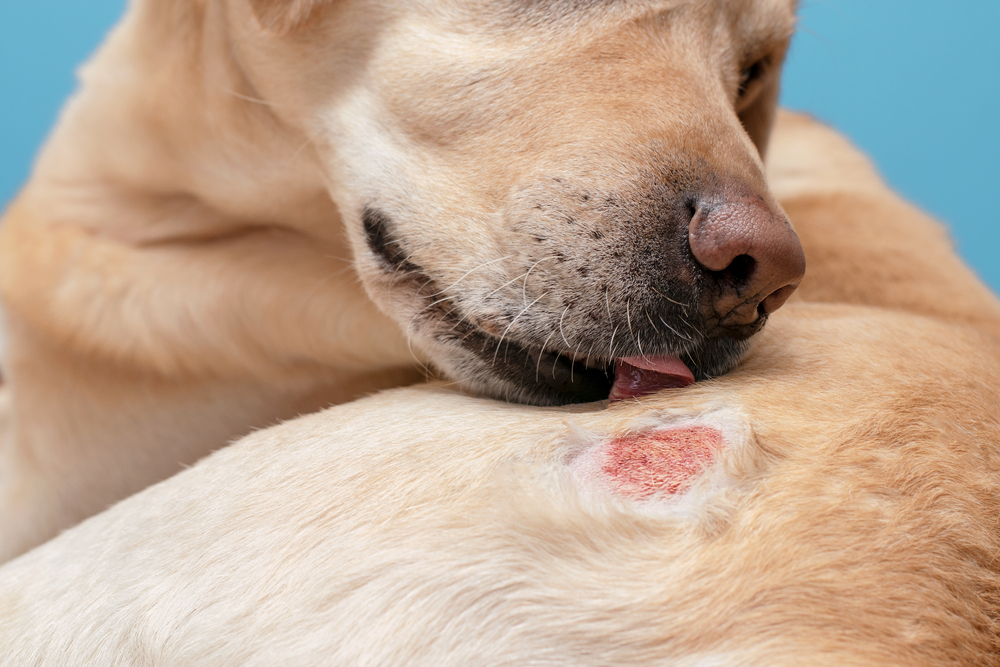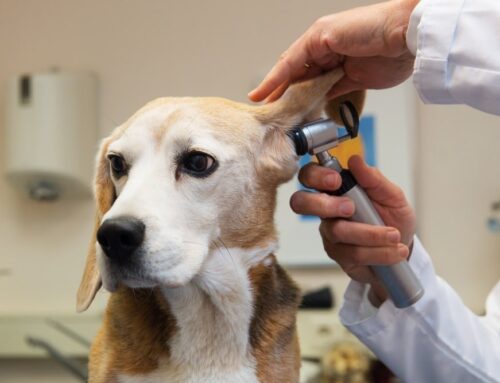You don’t enjoy feeling itchy, and neither does your pet. Your pet can’t tell you when they are feeling itchy, but their constant scratching, head shaking, licking, and jingling tags are a dead giveaway. If your pet’s constant itching has you scratching your head, you’re in the right place. Many conditions cause itchiness in dogs and cats, and our Emerald Animal Hospital team is sharing four common reasons—and treatment options—for your pet’s itchiness.
#1: Your pet may have fleas
Flea allergy dermatitis (FAD) is one of pets’ most common dermatologic diseases. When a flea takes a blood meal from your pet, the bug injects saliva into your furry pal’s skin. The saliva contains compounds that trigger a hypersensitive inflammatory reaction in allergic pets. Only one flea bite can cause an allergic reaction, and affected pets scratch, bite, lick, chew, and rub constantly to help relieve the itching. Hair loss commonly occurs, especially at the tail base. The constant scratching often leads to open abrasions, and you may see bite marks on your pet’s abdomen and groin area.
Because the itchiness usually causes a pet to groom excessively, they will likely remove the parasites. Our veterinary team uses a flea comb to check for flea dirt (i.e., excrement). If we find evidence of flea infestation, we will immediately begin your four-legged friend’s treatment, which involves removing the fleas from your pet’s fur and their environment, and prescribing medications to address the itching and secondary skin infections. The best way to protect your pet from fleas is to administer flea prevention medication year-round to kill adult fleas and prevent their eggs from hatching.
#2: Your pet may have mange
Mites are another common parasite that can cause itchiness in pets. Two mite species—Sarcoptes and Demodex—can cause mange, which occurs when mites burrow into your pet’s skin and lay eggs. These mites can trigger an allergic reaction and cause your pet’s skin to become inflamed and itchy.
- Sarcoptic mange — Sarcoptic mange (i.e., scabies) causes intense itchiness, which makes pets scratch for relief, resulting in coat damage, skin inflammation, and scabs. Sarcoptic mange is highly contagious, and humans can also contract this parasite.
- Demodectic mange — Pets with Demodectic mange (i.e., red mange or Demodex) feel less itchiness, but will lose hair, and have red areas with scaling and crusting, and skin lesions.
If your pet is scratching their ears or shaking their head, they may have ear mites, which, similar to sarcoptic mange, are highly contagious. Ear mites cause excessive ear irritation and discharge, and secondary ear infections.
If we suspect your pet has mites, our veterinary team will perform a skin scrape and assess the microscopic detritus. Many different topical and oral medications are available to treat mange. However, year-round, monthly prescription parasite control is your pet’s best insurance against infection.
#3: Your pet may have allergies
Pets with allergies develop a hypersensitivity reaction to an environmental allergen such as pollen, dust, and mold. Food allergies can also cause a pet to experience an allergic reaction. Pet allergies manifest through persistent, itchy skin, whereas people develop respiratory issues such as sneezing and watery eyes in response to these allergens. Atopic dermatitis is a chronic inflammatory skin disease associated with allergies, and affected pets often experience intense itching on their legs, face, ears, shoulders, and abdomen. To relieve the itch, pets scratch, lick, chew, and rub their skin, which can cause hair loss and secondary skin infections. Some pets will have atopy flares during certain seasons, such as amidst a high pollen count during the spring, or they will display allergy signs year-round if they’re allergic to dust or another ever-present allergen.
To diagnose atopic dermatitis, your veterinarian will perform tests to rule out other potential causes such as parasites, bacterial and fungal skin infections, and ringworm. Determining the exact allergen affecting your pet can be difficult. Your veterinarian may recommend various treatment trials to assess your pet’s response and learn clues about the underlying allergen, or they may perform blood or skin tests to check for specific environmental allergens. Pets’ allergy treatment options include:
- Anti-itch or anti-inflammatory medications
- Antibiotics or antifungals
- Topical medications
- Medicated shampoo
- Allergy immunotherapy
- Hypoallergenic diet
#4: Your pet may have a skin infection

Bacterial and fungal skin infections can be caused by organisms such as Staphylococcus bacteria, yeast, or ringworm. These skin infections can occur secondary to another issue, such as allergies, endocrine disorders, anatomical skin folds, or inadequate grooming. However, an infection can also develop as a primary condition. Secondary skin infections will not resolve completely unless your veterinarian also treats the underlying cause. In addition to itchiness, skin infections often cause oozing, inflamed skin that emits a strong odor. A few basic skin tests (e.g., skin cytology or biopsy, fungal or bacterial culture) can help determine a skin infection’s cause(s).
If your pet has been scratching, licking, or chewing more than usual, contact our Emerald Animal Hospital team to determine the cause, and we will provide your pet with some much-deserved relief.









Leave A Comment